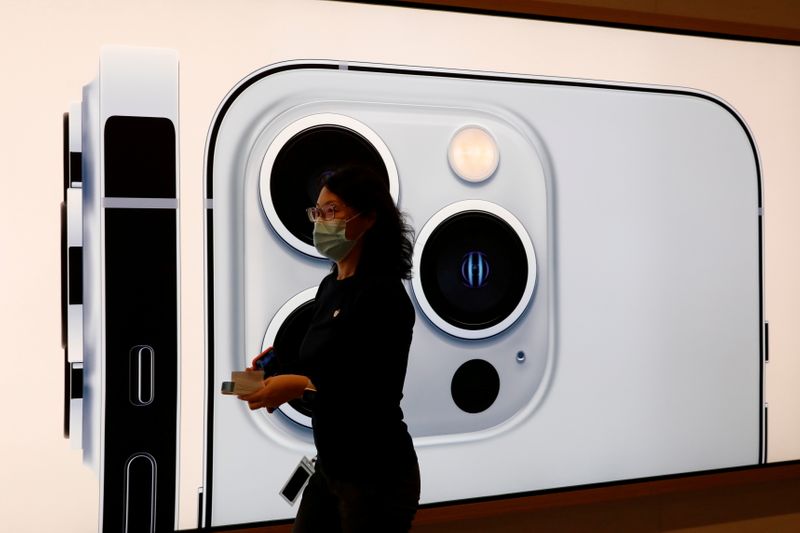Investing.com -- Here is your Pro Recap of the biggest earnings reports you may have missed this week and how analysts responded: numbers out of Apple, AMD, Starbucks, and Pfizer.
InvestingPro subscribers got this news in rapid fire. Never be left in the dust again.
Apple sales disappoint despite earnings beat
Apple shares (NASDAQ:AAPL) were down 1.7% in premarket trading Friday after the iPhone maker reported its third consecutive quarterly sales drop, even though fiscal third-quarter results topped estimates.
iPhone revenue, which makes up nearly half of total revenue, fell to $39.67 billion from $40.67B a year earlier, missing estimates of $39.91B. And revenue overall totaled $81.B - better than the $81.73 consensus, but down from $83B a year earlier.
Strength in Apple's services business helped offset the soft iPhone sales: Revenue from Apple News, Apple TV+, and iCloud, among other service units, grew to $21.21B from $19.60B a year earlier, ahead of estimates of $20.76B.
As for its bottom line, earnings per share came to $1.26, also topping estimates for $1.19.
Regarding the iPhone softness, in the earnings call, CFO Luca Maestri said the company expects iPhone and services performance to "accelerate from the June quarter" year over year. He also predicted more double-digit declines in Mac and iPad sales, "particularly on the Mac," due to difficult comparisons vs. the prior year.
In fiscal Q3, iPad revenue fell by 20% to $5.79B year-on-year in Q3. missing Wall Street estimates of $6.41B.
After the report, Morgan Stanley trimmed Apple's price target to $215 from the prior $220 while maintaining its Overweight rating on the stock. Barclays, for its part, raised the tech giant's price target to $167 from the prior $149, keeping its Equalweight rating.
AMD slips on concerns around AI exuberance
Advanced Micro Devices (NASDAQ:AMD) on Tuesday came in a penny better than consensus on EPS and edged out revenue estimates, while also delivering above-par Q3 guidance.
But shares fell 7% in the next session amid a broader tech selloff amid analyst concerns. Bernstein said it fears estimates "remain too high" amid optimism around AI "and the stock... looks a little stretched to us," according to Reuters.
Oppenheimer was also cautious, writing:
"Difficult to confidently model given lack of design-wins and/or timeline. [Gross margin] expected to improve 130 [basis points] to 51% in 3Q (mix). We remain sidelined as AMD’s AI strategy proves out."
CEO Lisa Su, meanwhile, said the company's artificial intelligence (AI) engagements climbed by more than seven times "as multiple customers initiated or expanded programs supporting future deployments of Instinct accelerators at scale."
The company earned $0.58 per share in the second quarter on $5.4B in revenue vs. Wall Street expectations for $0.57 and $5.32B, respectively, per analysts polled by InvestingPro.
Data Center sales declined 11% year over year to $1.3B, mainly attributed to lower sales of AMD's 3rd Gen EPYC processor, while Client revenue plummeted 54% to $998 million amid a slump in processor shipments due to a weaker PC market and a significant inventory correction across the PC supply chain.
Citi, for its part, upgraded AMD to Buy from Neutral after these results, bumping its price target by $16 to $136 per share.
"We thought AMD’s AI products (MI300) would be margin dilutive and investors would eventually care about the expensive valuation on AMD, and we were wrong on both counts," the analysts said.
Shares partially recovered on Thursday, rising 3.5% to $113.15.
Starbucks comes in ahead, but concedes challenging backdrop
Starbucks (NASDAQ:SBUX) beat earnings estimates even as global comparable sales missed amid signs of slackening demand for the coffeehouse giant's drinks and food in North America.
Adjusted earnings per share totaled $1.00, topping InvestingPro consensus estimates of $0.95, thanks to a sharp recovery in sales in China. That also represented a 23.4% rise from the prior year. Tapering commodity costs also offset the impact of spending on wages and worker benefits, boosting profit margin for the quarter ended July 2 up to 17.4%.
Comparable store sales in North America grew by 7%, missing expectations. On a global basis, comparable sales at Starbucks grew by 10%, below analysts' projections for an 11.1% jump.
Speaking to investors following the earnings, executives at Starbucks flagged that they expect to see continued revenue pressure in the fourth quarter due in part to a normalization in pricing trends after several months of price increases.
KeyBanc believes the company should be well-positioned thanks to its "scale, best-in-class digital platform, innovation competencies, and forward-thinking business mentality," but that "the operating environment remains challenged."
Stifel said it is "encouraged by the continued momentum in the U.S. business and the faster-than-expected pace of recovery in China during F2Q," but it maintained its Hold rating on the stock and lowered its price target by $7 to $110. The analyst added, "We would prefer a better entry point given the risks of softening consumer spending later this year and near-term setbacks in the pace of the China recovery."
Shares ticked higher by 0.9% Wednesday.
Pfizer beats, but sales slide
Finally, Pfizer (NYSE:PFE) on Tuesday slipped 1.3% after the pharma giant reported better-than-expected Q2 results, but also said revenue plummeted amid a major decline in COVID-related sales.
The company also cut its full-year revenue guidance warning of “near-term revenue challenges": It now expects sales of between $67B-$70B, with the high end trimmed by $1B vs. the prior range. Analysts are looking for $61B.
For Q3, Pfizer booked a profit per share of $0.67 on revenue of $12.7B, beating the analyst consensus for $0.57 on revenue of $12.08B, per analysts polled by InvestingPro.
The company sees full-year EPS at $3.35, better than the Street's $3.01 expectation.
CEO Dr. Albert Bourla said the company looks forward to "continuing our progress in the second half of 2023."
After these numbers, several firms - including JPMorgan, Morgan Stanley, and Wells Fargo - maintained their neutral ratings on the stock, with price targets ranging between $38 and $40. Truist and BMO Capital still call Pfizer a buy.
Yasin Ebrahim, Scott Kanowsky, Senad Karaahmetovic, Liz Moyer, and Davit Kirakosyan contributed to this report.

